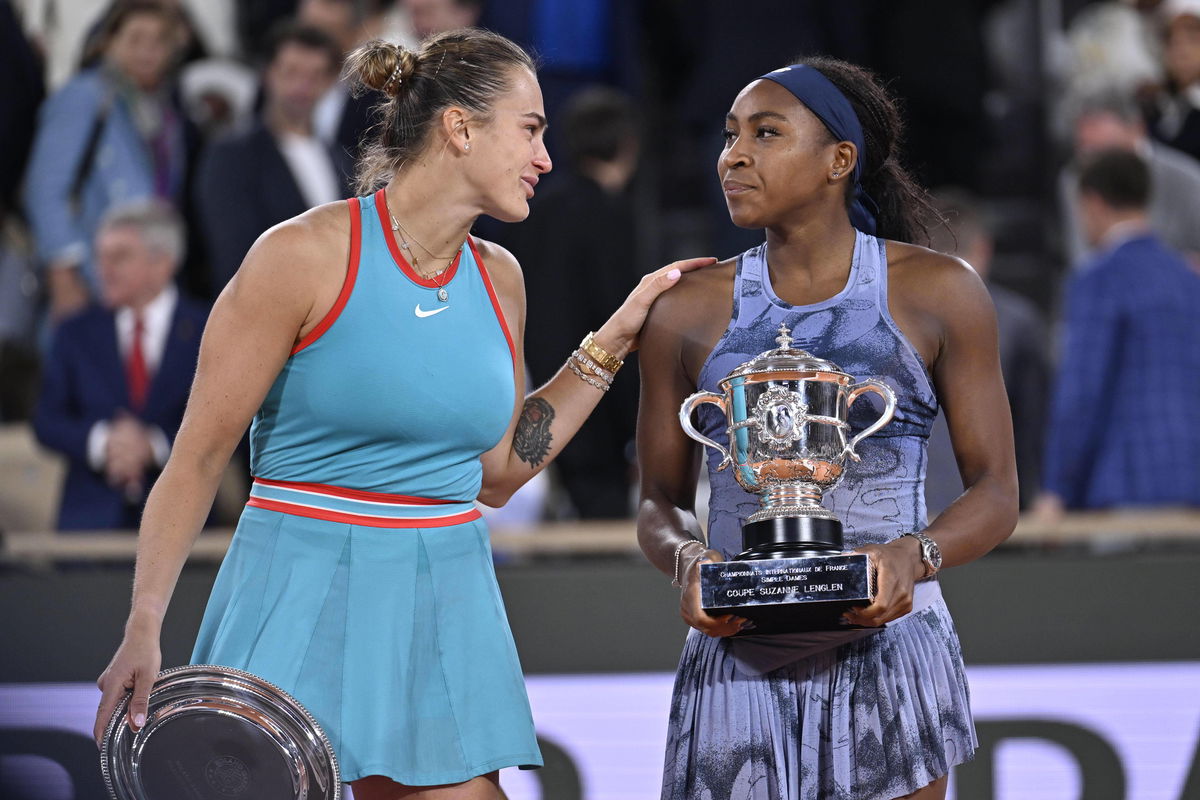
Imago
Coco Gauff beats Sabalenka to win French Open title PARIS, FRANCE – JUNE 07: US Coco Gauff R holds the trophy after winning her women s singles final match against Belarus Aryna Sabalenka L on day 14 of The French Open tennis tournament on Court Philippe-Chatrier at the Roland-Garros Complex in Paris on June 7, 2025 Burak Akbulut / Anadolu Paris France. Editorial use only. Please get in touch for any other usage. PUBLICATIONxNOTxINxTURxUSAxCANxUKxJPNxITAxFRAxAUSxESPxBELxKORxRSAxHKGxNZL Copyright: x2025xAnadoluxBurakxAkbulutx

Imago
Coco Gauff beats Sabalenka to win French Open title PARIS, FRANCE – JUNE 07: US Coco Gauff R holds the trophy after winning her women s singles final match against Belarus Aryna Sabalenka L on day 14 of The French Open tennis tournament on Court Philippe-Chatrier at the Roland-Garros Complex in Paris on June 7, 2025 Burak Akbulut / Anadolu Paris France. Editorial use only. Please get in touch for any other usage. PUBLICATIONxNOTxINxTURxUSAxCANxUKxJPNxITAxFRAxAUSxESPxBELxKORxRSAxHKGxNZL Copyright: x2025xAnadoluxBurakxAkbulutx
This year’s Roland Garros delivered a tale of hunger. Aryna Sabalenka’s agony after the loss painted a less appealing picture of the other side of greatness. After her crushing loss to Coco Gauff, Sabalenka admitted Gauff won “not because she played incredible” but due to her own “easy balls” errors, calling her display “just a joke.” Her remarks, seen as dismissive of Gauff’s triumph, drew sharp reactions, for which she later apologized. Yet now, Andy Roddick has stepped forward, defending the raw, imperfect humanity behind Sabalenka’s French Open behavior.
Watch What’s Trending Now!
Andy Roddick, speaking on the Served podcast recently, praised Sabalenka not only for her on-court improvements in serve since 2022, but also for reshaping how people perceive her temperament. “I think she is a prime example of the observations about her game, where you become good enough, and people say ‘Why has she not won a Slam?’ There is inconsistency; she is maybe a bit of a hot head,” Roddick said, noting how the narrative around Sabalenka has flipped with her success.
Roddick went further, celebrating her growth as a symbol of emotional authenticity. “She is also the most consistent player we have on the women’s side of the game. McEnroe operated differently from Pete (Sampras). Monica Seles operated very differently from Serena Williams.” His comparison underscored that greatness wears many faces, and not all of them are calm.
Mental toughness isn’t one-size-fits-all 💪 For players like Sabalenka, it’s raw, honest, emotional, and still elite. Check out the full conversation about how our Year End no. 1 uses authenticity as a superpower. Full episode link in our bio! 🔗
Presented by @ServiceNow pic.twitter.com/vAfSJkEpnv
— Served with Andy Roddick (@Served_Podcast) November 7, 2025
Reflecting on the evolution of mental toughness in tennis, Roddick added, “I remember these tropes from the early 90’s, when dealing with mental toughness, is like you have to be calm, you always have to be positive, that is the only way. I think figures like Sabalenka are just flipping those on its head. It’s like you can be imperfect, as long as that leads to better more often.” The point was sharp. Sabalenka’s imperfections aren’t flaws but fuel.
He continued with admiration for her accountability after the French Open final. “I think she has flipped it on its head and she is a great example of playing to your own strengths and not apologising for the way you are. After the French, she came out and owned it. We came on and said that was not great, it was beneath her. What did she say the next week? She said it’s not great, I don’t want to act like that. If someone comes on and owns it and calls Coco and confronts it personally. It doesn’t feel like a show with her. I think there is a level of authenticity that I have really, really grown to respect.”
And indeed, authenticity has become Sabalenka’s signature. Speaking ten days after her Roland Garros heartbreak, she didn’t shy away from owning her emotions. Sabalenka admitted she “absolutely regretted” her remarks toward Gauff, saying, “That was just completely unprofessional of me. I let my emotions get the better of me.” In a sport that thrives on poise, such honesty stood out: raw, vulnerable, and real.
Every player, however, walks a different mental path. Naomi Osaka is one such figure who has redefined what mental strength can look like. In 2021, she withdrew from the French Open after being fined and threatened for skipping media duties to protect her mental health. Her decision sparked a global conversation, and her openness about depression and anxiety changed how the sport views emotional well-being. Osaka’s stand proved that strength sometimes means stepping away, not pushing through.
Even Iga Świątek, the sport’s current model of consistency, travels with a sports psychologist to major events to maintain balance in the unrelenting grind of the tour. Mental fortitude has many shapes: quiet composure, fierce intensity, or the honesty to show one’s flaws.
And now, as Aryna Sabalenka steps into the WTA Finals to face Elena Rybakina, she carries not just power and precision, but the hard-earned resilience of a woman who turned imperfection into her greatest weapon.
Aryna Sabalenka admits she’s not an emotionless competitor
Throughout her early years on the WTA Tour, Aryna Sabalenka was a storm on court: fierce, fiery, and often fighting herself as much as her opponent. Her emotions, unfiltered and raw, would sometimes consume her rhythm, leaving her brilliance overshadowed by frustration. Critics questioned her composure, and the tag of emotional instability followed her through seasons of struggle. But every tempest finds direction, and Sabalenka’s transformation began with understanding, not suppression.
In 2023, she turned her volatility into fuel. Her improved command of emotions, paired with her fearless baseline assault, led to the defining breakthrough of her career, her maiden Grand Slam victory at the Australian Open. She backed it up with a US Open final that confirmed her rise wasn’t a flicker, but a flame.
The momentum only grew stronger. In 2024, Sabalenka defended her Australian crown with the heart of a champion, then this year lifted the US Open trophy back-to-back. Even this year, she reached two more Slam finals and the Wimbledon semifinals, proving that her emotional evolution had forged one of the most complete players on tour, passionate yet purposeful.
Yet, speaking on the Served podcast with Andy Roddick last year, Sabalenka peeled back the layers of her journey with rare honesty. “I absolutely agree with you that calmness does not show mental toughness. For some people it works. It’s not like there’s just one way. Some people, that’s just the way they are. They hold everything inside. For me personally, I don’t know, for many years I was trying to figure my emotions, everyone would tell me I have to keep it inside, I have to stay calm, I have to be like that player, like a no-emotions player, but this is not who I am,” she said.
Now, as she stands on the brink of another WTA Finals crown with Elena Rybakina across the net, the question burns again. Can Aryna Sabalenka harness that fire once more, keeping her emotions sharp but steady, to claim the final glory of the season?
If history has taught us anything, it’s that she thrives not despite her emotions, but because of them!


